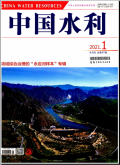中国水利Issue(15):39-44,6.
"双碳"目标下的节水与能源协同发展
Coordinated development of energy with water conservation under the carbon peaking and carbon neutrality goals
摘要
Abstract
Water and energy have a complex coupling relationship.To achieve the carbon peaking and carbon neutrality goals,and to effectively respond to the challenges of global climate change,it is urgent to research measures and strategies for the coordinated development of energy and water conservation,and explore technical paths to ensure the security of both water resources and energy.The coupling relationship between water and energy and the development trends of energy production and consumption are analyzed.Strategies for the coordinated development of water conservation and energy are proposed:on the one hand,it is necessary to implement water-based measures in the evolution of energy production and consumption to effectively reduce dependency on water and mitigate negative impacts,while exploring new water conservation avenues through the development of new energy sources;on the other hand,energy conservation and efficient utilization should be integrated into the entire process of water resources development and utilization.At the macro level,we should control the scale of water use,optimize the structure of water supply sources,and improve the layout of the water network.At the micro level,intensive energy utilization should be achieved in all aspects of water supply,consumption,and discharge.关键词
"双碳"目标/能源生产消费/节水/协同发展Key words
carbon peaking and carbon neutrality goals/energy production and consumption/water conservation/coordinated development分类
建筑与水利引用本文复制引用
胡庆芳,陈剑,王慧杰,苏鑫,张根瑞,刘连.."双碳"目标下的节水与能源协同发展[J].中国水利,2024,(15):39-44,6.基金项目
国家自然科学基金(52279019) (52279019)
中国工程院咨询研究项目(2022-PP-04). (2022-PP-04)

